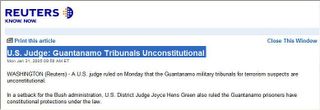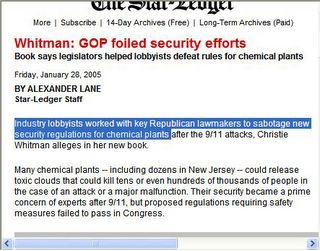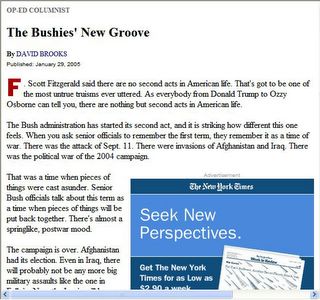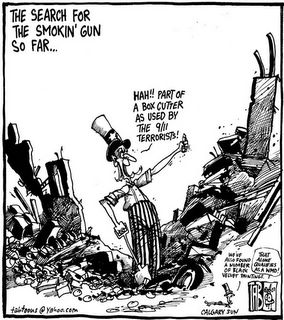"An explosion waiting to happen"
Iraq expert Amy Hawthorne discusses the possibilities -- but mostly the pitfalls -- of Sunday's elections.
- - - - - - - - - - - -
By Jeff Horwitz
Jan. 29, 2005 | In Iraq, in the White House and around the world, all eyes are fixed on Sunday, the day of Iraq's elections. Will those elections prove to be the start of a brighter day for the violence-torn country -- or the beginning of an even grimmer chapter?
Last week, in what would once have seemed a breathtaking display of honesty but now comes across as a simple acknowledgment of reality, the commander of American forces in central and northern Iraq admitted to a USA Today reporter that he could not protect Iraqi voters on Election Day. "I wouldn't begin to say that," Maj. Gen. John Batiste said when asked whether Iraqis could safely cast ballots. "It's very possible there will be some of ... the suicide vests and everything." It is also possible, Batiste conceded, that some of the Iraqi security personnel entrusted with guarding polling stations would themselves be insurgents.
It's hard to pinpoint when the Bush administration's public optimism about the elections began to falter, but by now even the always-upbeat president is heavily hedging his bets. "The fact that they're voting in itself is successful," he told reporters Wednesday, setting the bar low enough for any banana republic to pass.
To get a sense of the landscape of post-vote Iraq and the possibilities and pitfalls of Election Day, Salon spoke with Amy Hawthorne, a former analyst at the Carnegie Endowment for International Peace whose work has focused on promoting democracy in Arab countries. "It's almost surreal to think about the circumstances under which these elections will be taking place," Hawthorne told Salon. "But like almost everything in Iraq, the United States finds itself with no good options."
Do you think if officials in the Bush administration weren't bound to the Jan. 30 election date they would have wanted to postpone it?
It's difficult to say because the administration is driven by a political timetable that isn't completely tied to the realities on the ground in Iraq. That said, there are three contradictory pressures on the administration that have made the timing of the election very difficult. The first is the administration's own desire to demonstrate to the Iraqis and the American public that we aren't going to be staying in Iraq indefinitely, and what better way to signify that we're moving forward than by holding an election? It's the ultimate symbol of political progress in a post-conflict situation.
The second pressure is obviously the insurgency, which would argue for delaying the election until the violence subsides.
But the third factor is that a lot of people in Iraq -- most notably Shiite political forces -- are very keen on having an election because they want to gain political power for themselves. If the elections were to be postponed, there is the possibility that key players among the Shiite community would turn against the United States, and that's a very strong pressure to hold the elections quickly.
So now's as good a time as any?
Well, I want to be clear: I think it's a very bad time. It's almost surreal to think about the circumstances under which these elections will be taking place. But like almost everything in Iraq, the United States finds itself with no good options.
Sunni Muslims aren't expected to widely participate in the election, but even if they did, they'd still end up being a distinct minority. Why is their participation so crucial to the success of the election?
Many observers of Iraq really believe that the division of the country along ethnic and sectarian lines would be a very dangerous trend for the country. And an election that does not have at least a decent amount of participation from different groups in Iraq risks setting up the conception that political groupings are based primarily on ethnic or sectarian identity, and consolidating the de facto divisions we already see taking place among the Shia, the Sunnis, the Kurds, etc. So the vote does matter, and it matters who takes part, and how many votes they get, because you're planting the seeds for a future system.
From what I can tell, there are Shiite political players in Iraq who are interested in having the constitution-drafting process not be exclusionary, and including Sunnis in the process by appointing them. That is a positive development, obviously, but there is a kind of legitimacy that comes from being elected. With a National Assembly where the vast majority of the members were elected by voters and some people were appointed, the process would be skewed.
There have been very divergent estimates of what turnout will look like. You wouldn't want a hazard a guess on that?
I have no idea. In our own country, people can poll and predict turnout, and if it's raining that day, the turnout might be very low. In a situation like Iraq, it's difficult even to know what kind of information is being disseminated at the community level. From what I can tell from talking to people who have recently been there and reading news reports, there is a large degree of enthusiasm about the process but a lack of information about what these elections are actually for. I'm not sure that the voter education program has managed to explain to people what they're voting for.
Also, we don't know how powerful the intimidation campaigns are. If there are rumors going around that people's families are going to be killed if they go and vote, that will keep people home. I think what might be just as interesting as the turnout in a way is seeing how the Bush administration spins the turnout numbers. I guess some of their polling suggests that the turnout might be about 60 percent, and now administration officials are saying, "Well, that's what the turnout was in our presidential election, and that was legitimate."
Considering how confused the campaign season has been, how do you think people will decide whom to vote for?
I'm just purely speculating, but my guess is that because of the nature of the election system and the security situation -- many candidates are not campaigning openly, and their names aren't even being published -- the information that people have about whom they're voting for is limited.
There are many social forces in Iraq that are probably more powerful than the media and whatever information campaigns the U.N. might be sponsoring. People are going to be making decisions based on those kinds of forces: who people in their family are voting for, what is being said at the mosque and so on. People will vote for candidates from their community whom they know, and the Shiite-affiliated candidates have a really powerful network of mosques and other religious institutions behind them.
From what I can tell from media accounts, a lot of people know maybe the number of a particular candidate list, and maybe that [Grand Ayatollah Ali] Sistani encouraged them to support that list. And that's what they'll be voting on.
How much of Iraq's vote is Sistani going to control?
I can't hazard a guess in terms of numbers, but the Shiite religious institutions, and especially the ones in Najaf that Sistani influences, are very powerful. There's probably nothing in terms of organizational ability that comes close. There aren't strong political parties, there isn't a strong civil society, and there isn't a strong media. And while it's not that religion is the only influence, Sistani is the biggest player in the most powerful institution -- so far -- in the country.
In light of Iraq's colonial history, would you say that an Iraqi national identity really exists? Are we trying to hold an election in a country where people don't primarily think of themselves as citizens of that country?
All I can really say is that you get two very different answers to that question from Iraqis themselves. Some believe there is a very strong Iraqi identity, similar maybe to Egyptian nationalism in the sense that it's historic. Other people I talk to take the complete opposite view, saying, "No, there isn't any such thing. We're a nation that was cobbled together, and now that the repressive system holding us together has been broken apart, there's no way we can stay together."
I think that how people answer that question will ultimately be based on how successful the reconstruction process is. Seeing economic success, security and a workable pluralistic system will encourage them to believe in a national identity. But if Iraq continues to be a state that cannot provide security or jobs for many of its citizens, Iraqis are more likely to say, "A national identity doesn't make sense to us. We need to subdivide."
Apparently there isn't going to be on-the-ground election monitoring. What do you suppose the odds are that the election will be widely perceived as nonfraudulent?
I've worked on election observation issues a lot in the past, and it's important to keep in mind that the presence of international observers does not forestall the perception that the election was fraudulent. Observers can help, as we just saw in Ukraine, but just having them doesn't necessarily mean that they'll give legitimacy to the process.
This is going to sound strange, but in a situation that's as politicized as this one is, it may be better in some ways that there aren't going to be international monitors. I think that the political pressure on monitors to pass a judgment on the quality of the election would be very strong, so I think that even if the observers themselves had lots of integrity, it would still be tricky.
I think the legitimacy of the process will be contested based on the results. This is not an election after a war when all the key players have come together and negotiated a framework for the country to move forward, and agreed to accept the results no matter what happens. There hasn't been that coming-together process in Iraq, even though the U.S. has tried to foster it.
The violence in Iraq has recently moved from being implicitly sectarian to overt, such as Abu Musab al-Zarqawi's anti-Shiite message and the bombings of Shiite mosques and weddings. Are those tied to the election, or is this just the beginning of a religious and ethnic war?
If you're asking if attacks on sectarian targets will end after the election, no, I don't think they will. The people who are carrying them out are highly organized, are highly motivated and seem to have abundant resources and recruits willing to blow themselves up. The election will not be definitive enough or successful enough to deter them.
What's interesting is that although many of the recent attacks seem to be aimed at Shiites, Shiite forces have not responded in kind. Overall, the Shiite political leaders have urged restraint and are satisfied for now to let the American forces do their fighting for them against what I assume are Sunni insurgents.
That might change in the next few months if the Bush administration shifts to a strategy of emphasizing American military advisors and having Iraqi security forces -- many of whom will be Shiite -- fight their fellow countrymen. The tensions may get worse then because the forces in Iraq that have been holding themselves back may not once they're in power.
What election results would be acceptable or unacceptable to the Bush administration?
They obviously haven't addressed that question much directly, but from what I can tell the U.S. has two unofficial but clear red lines. One would be for the new government of Iraq to demand that U.S. forces leave immediately. I think that would be an unacceptable result.
The other bad result, which some administration officials have talked about publicly, would be if a government came to power and said, "We are going to create a new Iraq that is based on Islam in every facet."
Those are the two red lines, and I think neither is likely to happen in the near term. But even if one of those red lines were crossed, what are we going to do about it? Are we going to say, "No, you can't have the government you want," or "No, we're not leaving"?
However flawed the elections are, they will produce an elected Iraqi government. And how is the Bush administration going to balance what it would like to see happen with what the Iraqi leaders would like to see? Things get more complicated after Jan. 30, not less.
There are a number of different major Shiite slates. What are the differences among them and, in particular, what are the fault lines?
Again, we'll know more after the election, but one of the big fault lines is between parties that were in exile during the time of Saddam and political forces that worked underground or weren't backed by a major power like Iran or the United States. That's a big division, and from anecdotal reports, it seems like a lot of Iraqis really resent parties like SCIRI, whose leadership was abroad and sat out those years while Iraqis suffered. On the other hand, the parties that were on the outside are much better funded and have a much better organizational structure, which makes up for what they lack in grass-roots support.
The second fault line is between the parties that have a strong religious character and the parties that have Shiite members who are playing up their Shiite identity but have less of a religious character, such as the Iraqi National Congress led by Ahmad Chalabi. Whether voters are going to be looking at the religious character of the parties or bread-and-butter patronage issues is unclear. And how much debate about the constitution is taking place -- which is after all what this elected government is supposed to produce -- isn't clear either.
You mentioned Chalabi, and I wanted to ask what he's up to. He has been working with the Sadr-ists, alleging that $300 million was covertly shipped out of Iraq, and has been threatened with deportation to Jordan. What's going on?
From what I can tell, the guy has amazing political skills. He was one of the driving forces going back a decade ago for mobilizing political support in Washington for the overthrow of Saddam Hussein. You've got to give the guy credit.
So those who counted him out and thought that he was a lackey without any influence misunderstood him. The guy knows how to play the game. As for how much appeal he has inside Iraq, I have no idea. He's willing to cut deals and build alliances with all kinds of people, and it's hard to see what his agenda is other than getting himself into power. In some ways, he seems implausible, but he's also a political survivor with an ability to work patronage networks, which counts for a lot in Iraq.
What about Kirkuk? There's been a massive influx of Kurdish refugees, and Kurds will likely dominate the vote up there both in this and future elections. How will that sit with the rest of Iraq?
Everywhere you turn in Iraq, there's an explosion waiting to happen, literally or politically. Most of the Western media reporting has focused on the insurgency, but there are other festering problems, like Kirkuk and the whole question of Kurdish autonomy, that could come to the fore at any time. The Kurds are taking part in the election, and they're highly organized and will do well for themselves. But they're also trying to figure out whether it's better for them to stay within Iraq or push to become independent. And so far, they've chosen to stay within the country, but they're hedging their bets. And if Kurdish political forces believe they aren't going to be able to bring Kirkuk within their own political orbit, you could see a lot of problems.
What would you say is the best, worst and most realistic outcomes of the election?
In a country where there isn't already a consensus, we hope the elections go relatively smoothly and that the violence is maybe less than we anticipate. But I think that this election process, because of the conditions under which it's being conducted and all the pressure being put on it from different forces, may actually cause more conflict than it resolves.
The way we look at the elections here is as a date-driven process. June 30: Iraq is sovereign. Jan. 30: The election takes place. We expect that the next day the situation will change. I think the positive step of this election is just that there's no other way to produce a parliament to write a constitution that will have some sort of local legitimacy. But the issues the Iraqi National Assembly will be debating are so contentious that we should be ready for more rocky times ahead, not less. I'm always a pessimist when it comes to the Middle East, but I think the election could be conflict-provoking. It's not just that there's a group of insurgents attacking people who want to vote and everyone else is agreed on what kind of country Iraq is going to be. Once you've got people in power and people out of power, the stakes get a lot higher.
- - - - - - - - - - - -
About the writer
Jeff Horwitz is an editorial fellow at Salon.
Sound Off









